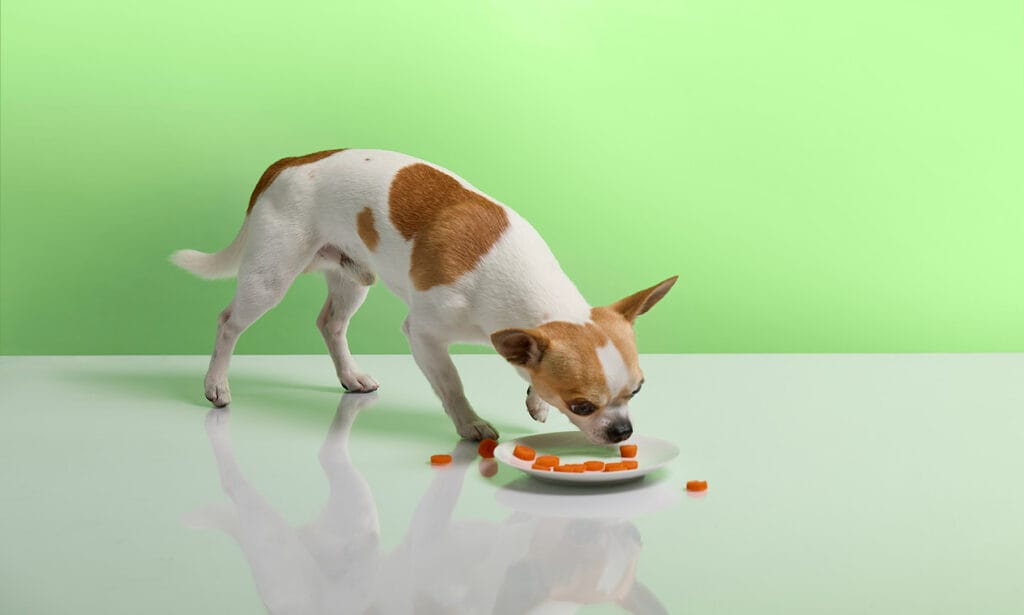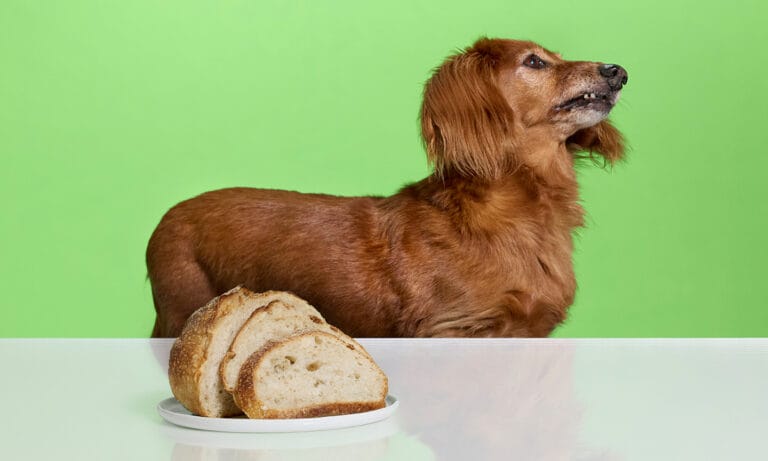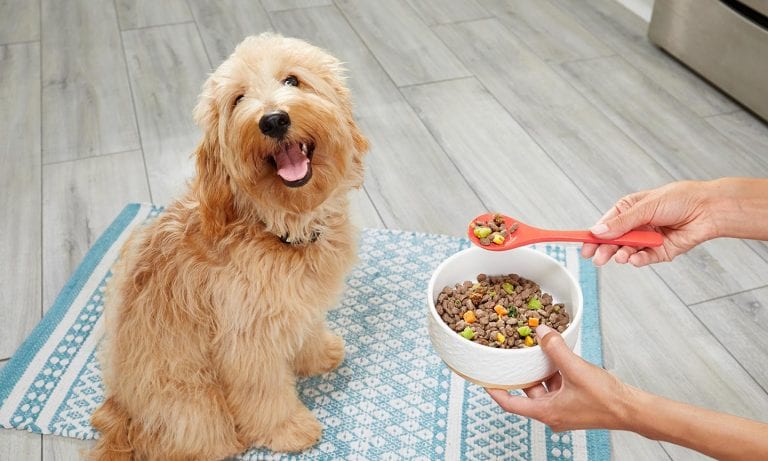Dogs can certainly eat sweet, crunchy, colorful carrots. Not only is the veggie packed with nutrients and fiber, but it’s also healthy snack and low-calorie treat for our canine friends.
Let’s dig into the various benefits of feeding carrots to dogs—and then go over the six easy, pantry-friendly ways you can transform this year-round staple into a yummy homemade treat for your BFF.
Before serving any new foods to your pet, consult with your veterinarian first.
Are Carrots Good for Dogs? The Health Benefits of Carrots
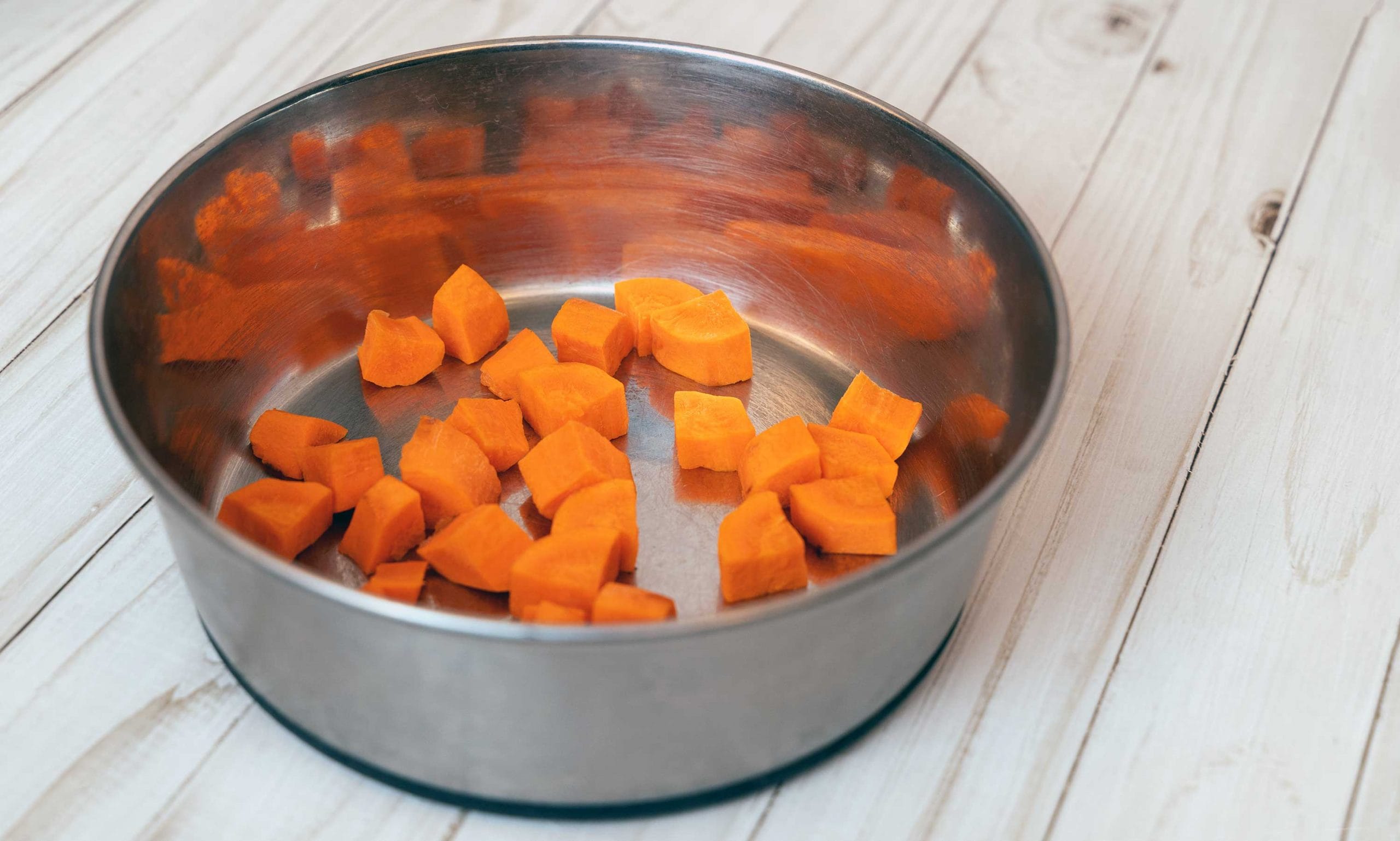
- Carrots are excellent sources of vitamins, minerals and other nutrients, like potassium, antioxidants, vitamin A, vitamin K, vitamin B6, beta-carotene, calcium and iron.
- Beta-carotene, a type of carotenoid, is the nutrient that turns carrots orange and also promotes good health. It converts to vitamin A when consumed in foods and gives other fruits and vegetables their yellow or orange color. Evidence suggests that increased intake of antioxidant rich foods protect cells from damage.
- Vitamin A is crucial for eye health and helps boost a dog’s immune system.
- Low in calories and high in fiber. One medium carrot contains about 25 calories (and 2 grams of fiber) making them an ideal snack for a dog who needs to lose a little weight.
- Carrots help support your dog’s dental health. They contain an enzyme that can help clean and whiten your dog’s teeth.
Feeding Your Dog Carrots: 7 Ways to Serve the Tasty Veggie
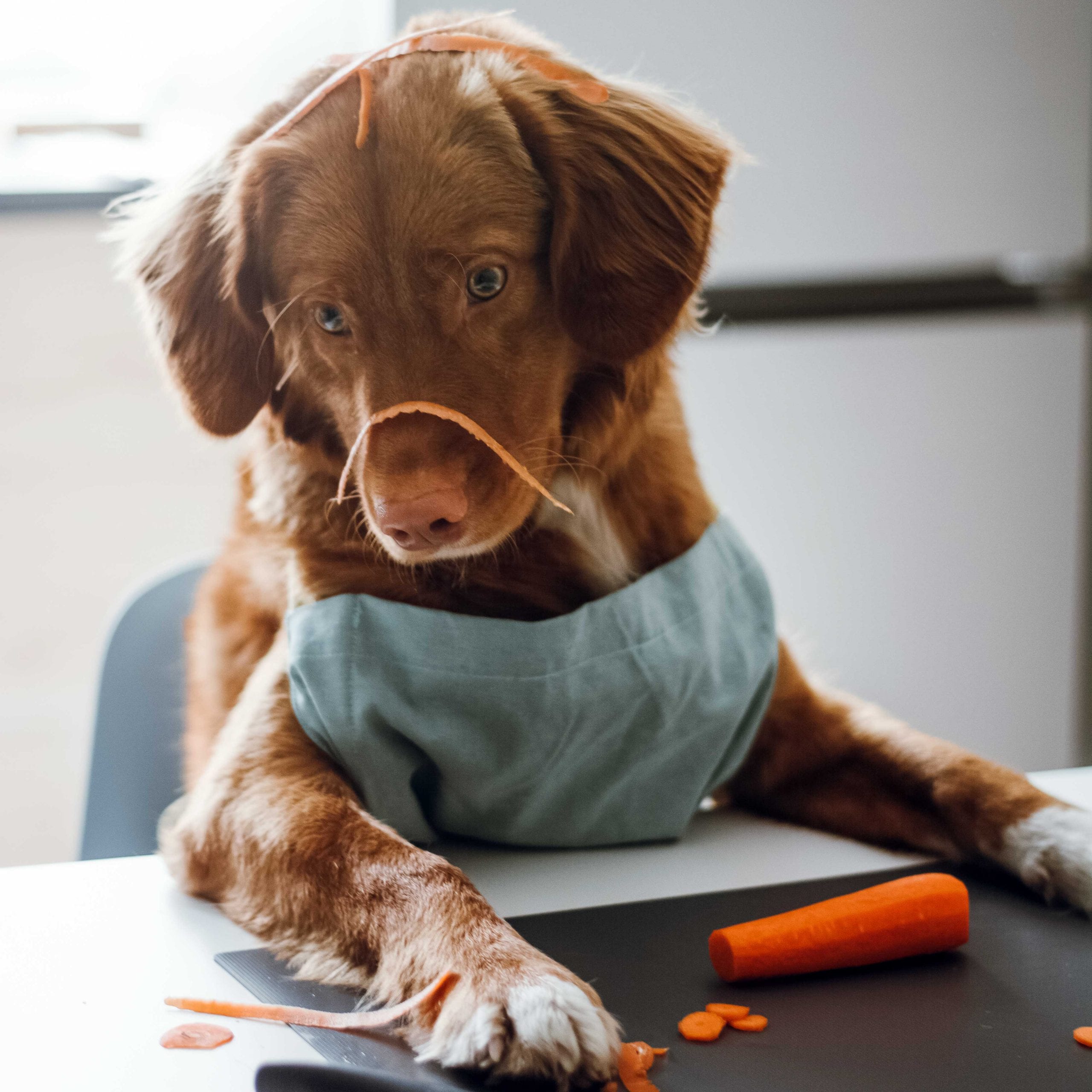
Grate It
Use as a Food Topper
Grating carrot on top of your dog’s dinner is a low-prep option that adds a little extra deliciousness to their meal and can be a great solution for enticing a fussy eater.
Peel before grating carrots over what they’d normally eat.
Cook It
Mix Into Their Kibble or Disguise Medicine
When peeling carrots for yourself, save all the peelings for your pooch.
Cook and mash the peels, or blend until smooth.
A dollop of this cooked carrot puree is a great way to disguise some yucky medicine. Or, mix the puree into their dry kibble!
Juice It
Make a Slurp-Worthy Drink
If your dog is not a vegetable lover, juicing may be a fun way to add carrots to the diet.
Carrot juice is extremely high in vitamin A, but the fiber in carrots is lost during juicing.
To make sure your dog doesn’t miss out on the healthy fiber, add some of the pulp back into the juice before adding it to their bowl.
Just peel the carrots, run them through a juicer, pour and serve!
(Fresh juice should be consumed right after it’s been made. It can be stored in the fridge for a day, but no longer.)
Steam It
Serve as a Belly-Warming Snack
If you’d rather cook carrots before giving them to your dog, the healthiest way is to lightly steam them, which enhances their flavor while retaining most of the nutrients.
Here’s how to easily steam carrots for your dog:
- Add 2 inches of water to the bottom of a saucepan and bring to the boil.
- Slice the carrots into strips or batons, and place them in a steamer basket over the boiling water.
- Cover the saucepan.
- Steam the carrots for 8 to 10 minutes.
- Drain the carrots into a colander.
Freeze It
Serve as a Soothing Teething Aid
Large frozen carrots not only make for inexpensive, edible chew toys, but they may also help relieve discomfort for teething puppies and can slow down an aggressive chewer while still offering vitamins and minerals.
Always watch your pup when they’re chewing on frozen carrots. Don’t offer more than one whole carrot a day because of the high fiber content. And never freeze baby carrots, which can be a choking hazard for dogs.
Bake It
Make This Two-Ingredient Homemade Carrot Biscuit
It is very easy and cost effective to bake your own dog treats, and carrots are ideal for baking into treats because of their natural sweetness.
Follow these steps to bake carrot treats for your dog:
- Preheat oven to 350 degrees Fahrenheit.
- Combine mashed, steamed carrots with enough whole-wheat flour to create a dough.
- Roll out the dough and cut into shapes.
- Place the cookies on cookie sheets lined with parchment paper.
- Bake for 12 minutes or until golden brown.
Bake It (Again!)
Make Carrot Crackers, Chips or Sticks
Ever wondered what to do with the extra pulp that is left over after juicing? Feed it to your furry friend as a tasty cracker:
- Mix three cups of carrot juice pulp with ½ a cup of flax seed.
- Add just enough water so the pulp will be easy to spread.
- Spread the mixture to about ¼ inch thickness on a dehydrator sheet or a parchment-lined baking sheet and cut squares.
- If using a dehydrator, dehydrate at 120 degrees Fahrenheit for about six hours, then flip and dehydrate for another four hours.
- Without a dehydrator, place in the oven at the lowest setting with the oven door slightly open. Timing will be different when using an oven versus a dehydrator. You may need to dehydrate for less than half the recommended time (six hours then four hours), so check them periodically.
- Store in an airtight container to keep them crunchy.
To make carrot crisps, follow our zucchini crisps recipe but slice the carrots on the long way and slightly thinner, rather than into disks. A peeler does this job well.
Most dogs will happily eat carrots, but if you have a fussy eater, there are still ways to get carrot into their diet. Cut them into sticks, then soak the sticks in boiling water flavored with concentrated chicken stock until cool. Then, drain them and put them into zip-lock bags for the perfect on-the-go snack or training treat.
Pet Parents Recommend These Carrot-Rich Dog Foods
FAQs about Carrots for Dogs
Q:Can dogs eat raw carrots?
A:
Yes, dogs can eat raw carrots as long as you cut them into small, bite-sized pieces to prevent them from becoming a choking hazard.
This is especially true for smaller dogs, but with all dogs, you should monitor when they’re snacking on a harder vegetable, like carrots.
Q:Can dogs eat carrot cake?
A:
Sorry, while we love this confection for ourselves, carrot cake is off the menu for your dog. It’s typically high in calories and can contain artificial sweeteners such as Xylitol, ingredients such as raisins and some kinds of nuts and spices such as nutmeg—all of which can be dangerous for dogs to consume.
And of course, there is that no-can-eat, dairy-rich, fatty cream cheese frosting to consider.
Best to pass on this one.
Q:Can dogs have carrot chips?
A:
Commercially prepared bags of carrot (or other veggie chips) are likely to be salted and/or be enhanced with other spices that may not be safe for your dog to consume.
But homemade carrot chips—sliced thin and baked without salt and served in small amounts—is a perfectly fine treat for dogs.
Q:Can dogs have purple or yellow carrots?
A:Indeed, your dog can enjoy the rainbow of colors of carrots you might find at your grocery store or farmer's market. As with all fresh produce, try to buy organic when possible, and scrub well before serving.
And here are some fruits dogs can eat:
Share:
